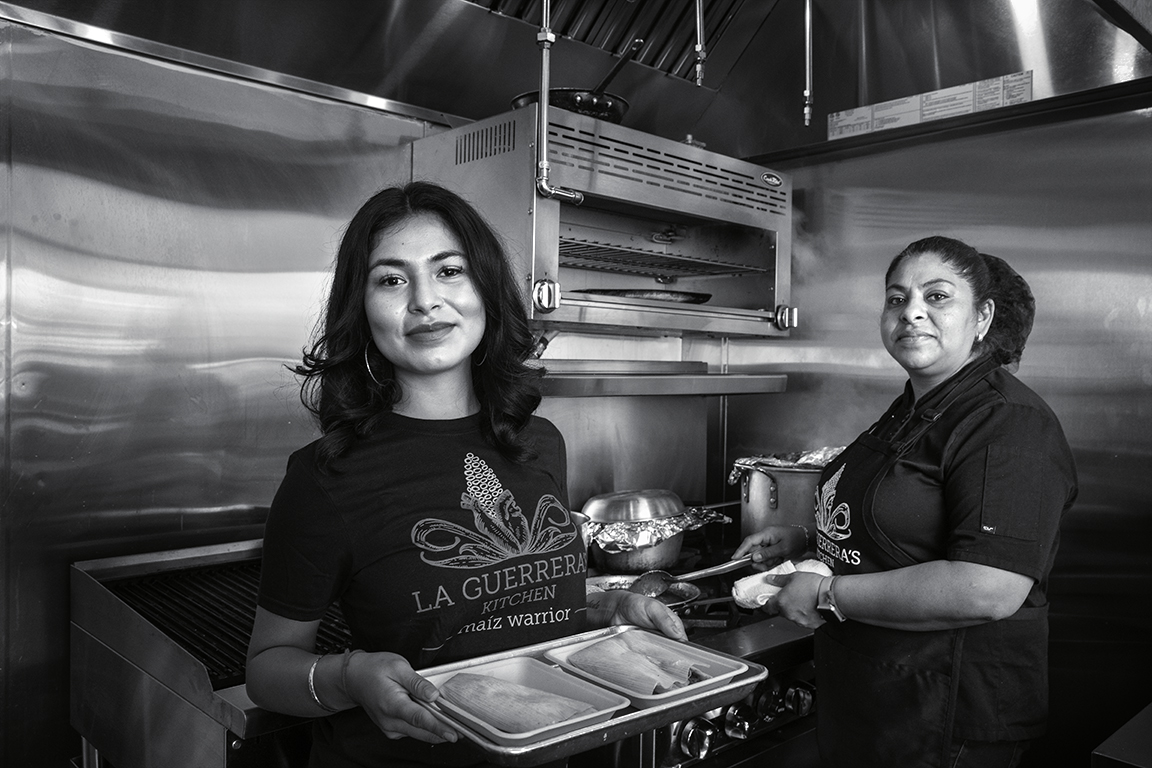
Reyna Maldonado and Ofelia Barajas
Mexico
Founders of La Guerreras Kitchen
My name is Reyna Maldonado and I was born in Guerrero, Mexico. I came to the US in 1999 when I was 6 years old and lived with family in the Mission District in San Francisco. I went to Mills College and that is how I winded up in Oakland. I have DACA so I’m documented.
My parents came to the US for economic opportunities. My mom, when she came to the US was working for different restaurants. Then she got pregnant and she needed to have more time with the family and she needed more flexibility than working in a restaurant. So she decided to just build her own business and sold tamales in the Mission District in San Francisco as a street vendor for 15 years.
Then we joined La Cocina two years ago, a non-profit that helps low-income food entrepreneurs grow their businesses. We took their workshops and their classes. From there, we graduated and we initially wanted to do farmers’ markets and pop-ups and catering and they were like, “We think you could have a restaurant.” We were like, “Yeah, but that’s something that’s going to happen years from now because everything in the Bay Area is so expensive.”
But an opportunity for this space opened up and with their support we were able to get loans while being undocumented, and do all of this paperwork that’s required while not having social security.
It has been challenging to learn how to be undocumented entrepreneurs in an economic system in the US that is designed for mostly rich white people to succeed in these spaces. I think for us, we understood that it’s going to take us more work to get what we wanted and have access to these things we needed to succeed.
The government’s attitude towards immigrants has taken a toll on us. As we opened this business during this time, I think it has been in the back of our minds like how do we protect ourselves while we’re so open about our status and our story and also have an open space. I think for us, it’s almost like we want to tell undocumented entrepreneurs what is possible, you can make this happen. But I think that it is scary and at the same time, it is part of our way of surviving and resisting everything going on.
We hope to see communities not being detained or getting deported and being separated. I think that that’s one of our biggest dreams here. For us, it also opens the doors on how do we create a business that can support communities and families that are undocumented.
I think food can definitely bring people together. Food has such a human connection and it can open people’s hearts. For us, our experience has been very interesting in where our food and our flavors are recognized. Our food is from Guerrero, Mexico and so that’s still something that we carry with us even though we have migrated here. There have been people who come here from Guerrero and are like, “Oh my God, I have not tasted pozole like this in so long!” I think those tastes can take us back into our homes and into our spaces that we grew up in.
I don’t do any of the cooking but I want to learn. My mother said that she would like for us to learn everything because these are recipes from her grandparents and she wouldn’t want this tradition to get lost. I get to see my mom work so hard and also putting so much love into her food and she always asks us to taste it. I’m starting to recognize a lot of the flavors and all the unique spices that go into it. I was organizing my mom’s spices the other day and I thought it was so interesting because she has all types of chilies. For my 21st birthday, she gave me a cookbook with all of her recipes. I have only cooked once but I really admire her cooking and hope that I can learn how to cook and spend some time with those recipes.
